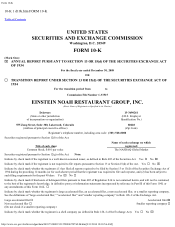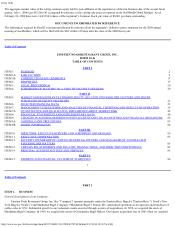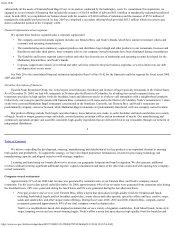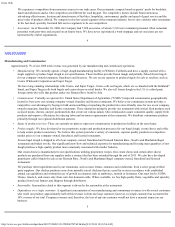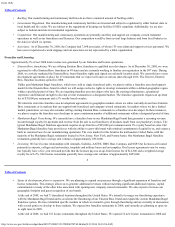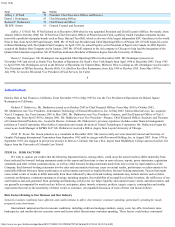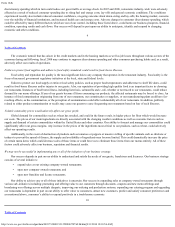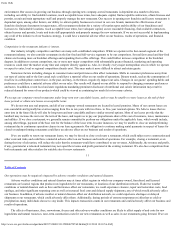Einstein Bros 2008 Annual Report Download - page 10
Download and view the complete annual report
Please find page 10 of the 2008 Einstein Bros annual report below. You can navigate through the pages in the report by either clicking on the pages listed below, or by using the keyword search tool below to find specific information within the annual report.
Form 10-K
http://www.sec.gov/Archives/edgar/data/949373/000119312509042707/d10k.htm[9/11/2014 10:10:56 AM]
environment. Our success in growing our business through opening new company-owned restaurants is dependent on a number of factors,
including our ability to: find suitable locations, reach acceptable lease terms, have adequate capital, find acceptable contractors, obtain licenses and
permits, recruit and train appropriate staff and properly manage the new restaurant. Our success in opening new franchise and license restaurants is
dependent upon, among other factors, our ability to: attract quality businesses to invest in our core brands, maintain the effectiveness of our
franchise disclosure documents in target states, offer restaurant solutions for a variety of location types and the ability of our franchisees and
licensees to: find suitable locations, reach acceptable lease terms, have adequate capital, secure reasonable financing, find available contractors,
obtain licenses and permits, locate and train staff appropriately and properly manage the new restaurants. If we are not successful in implementing
any or all of the initiatives of our business strategy, it could have a material adverse effect on our business, results of operations, and financial
condition.
Competition in the restaurant industry is intense.
Our industry is highly competitive and there are many well-established competitors. While we operate in the fast-casual segment of the
restaurant industry, we also consider restaurants in the fast-food and full-service segments to be our competitors. Several fast-casual and fast-food
chains are focusing more on breakfast offerings and expanding their coffee offerings. This could further increase competition in the breakfast
daypart. In addition to current competitors, one or more new major competitors with substantially greater financial, marketing and operating
resources could enter the market at any time and compete directly against us. Also, in virtually every major metropolitan area in which we operate
or expect to enter, local or regional competitors already exist. This may make it more difficult to attract and retain guests.
Numerous factors including changes in consumer tastes and preferences often affect restaurants. Shifts in consumer preferences away from
our type of cuisine and/or the fast-casual style could have a material effect on our results of operations. Dietary trends, such as the consumption of
food low in carbohydrate content have, in the past, and may, in the future, negatively impact our sales. Changes in our guests’ spending habits and
preferences could have a material adverse effect on our sales. Our results will depend on our ability to respond to changing consumer preferences
and tastes. In addition, recent local and state regulations mandating prominent disclosure of nutritional and calorie information may result in
reduced demand for some of our products which could be viewed as containing too much fat or too many calories.
We occupy our company-owned restaurants under long-term non-cancelable leases, and we may be unable to renew leases at the end of their
lease periods or obtain new leases on acceptable terms.
We do not own any real property, and all of our company-owned restaurants are located in leased premises. Many of our current leases are
non-cancelable and typically have terms ranging from five to ten years with two three- to five-year renewal options. We believe leases that we
enter into in the future likely will also be long-term and non-cancelable and have similar renewal options. Most of our leases provide that the
landlord may increase the rent over the term of the lease, and require us to pay our proportionate share of the cost of insurance, taxes, maintenance
and utilities. If we close a restaurant, we generally remain committed to perform our obligations under the applicable lease, which would include,
among other things, payment of the base rent for the balance of the lease term. In some instances, we may be unable to close an underperforming
restaurant due to continuous operation clauses in our lease agreements. Our obligation to continue making rental payments in respect of leases for
closed or underperforming restaurants could have an adverse effect on our business and results of operations.
If we are unable to renew our restaurant leases, we may be forced to close or relocate a restaurant, which could subject us to construction and
other costs and risks, and could have a material adverse effect on our business and results of operations. For example, closing a restaurant, even
during the time of relocation, will reduce the sales that the restaurant would have contributed to our revenues. Additionally, the revenue and profit,
if any, generated at a relocated restaurant may not equal the revenue and profit generated at the existing restaurant. We also face competition from
both restaurants and other retailers for suitable sites for new restaurants.
11
Table of Contents
Our operations may be negatively impacted by adverse weather conditions and natural disasters.
Adverse weather conditions and natural disasters may at times affect regions in which our company-owned, franchised and licensed
restaurants are located, regions that produce raw ingredients for our restaurants, or locations of our distribution network. If adverse weather
conditions or natural disasters such as fires and hurricanes affect our restaurants, we could experience closures, repair and restoration costs, food
spoilage, and other significant reopening costs as well as increased food costs and delayed supply shipments, any of which would adversely affect
our business. In addition, if adverse weather or natural disasters affect our distribution network, we could experience shortages or delayed
shipments at our restaurants, which could adversely affect them. Additionally, during periods of extreme temperatures (either hot or cold) or
precipitation, many individuals choose to stay inside. This impacts transaction counts in our restaurants and could adversely affect our business and
results of operations.
The effects of hurricanes, fires, snowstorms, freezes and other adverse weather conditions are likely to affect supply of and costs for raw
ingredients and natural resources, near-term construction costs for our new restaurants as well as sales in our restaurants going forward. If we are

